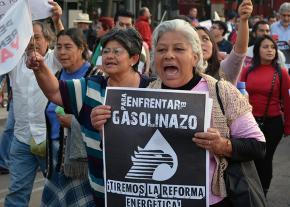On the same side as Peña Nieto?
A member of the Action and Resistance Collective of Mexico analyzes Enrique Peña Nieto's effort to deflect opposition with an anti-Trump "Vibra Mexico" campaign.
DONALD TRUMP'S election has been a disaster for the Mexican government, which was already deeply unpopular even before it was faced with a new U.S. president making threats against the Mexican people.
Twenty-eight months after the forced disappearance of 43 students from the Ayotzinapa Teachers College, the political crisis in Mexico has only deepened, especially after the federal government's decision to increase fuel prices, which unleashed a series of massive protests, dubbed the gasolinazo, that have marked some of the largest nationwide unrest in decades.
According to one January poll, approval for Peña Nieto has sunk to a historic low of 12 percent.
In the face of this growing anger, the Mexican business class has tried to stir up patriotism as their unifying banner, calling for "national unity" with Peña Nieto in his crusade to demand that Trump respect the interests of Mexican capital.
On January 28, Peña Nieto posted on his Facebook page a video praising the army and patriotic symbols under the motto #TodosSomosMéxico. Since then there has been a rise of nationalist propaganda and a tendency in social networks to promote the national coat of arms and flag while joining in the call for national unity.

Both the traditional media and the mainstream political parties have joined in, including the center-left Party of the Democratic Revolution (PRD) and Andrés Manuel López Obrador's MORENA, which formed in 2013 in reaction to the PRD's degeneration.
Among the Mexican middle and upper classes, there has been talk of boycotting U.S. companies--without the slightest recognition of just how dependent the Mexican economy is on international trade and security treaties with the United States.
OUT OF this mood of upper-class nationalism has come Vibra Mexico (Mexico Rumbles), which is made up of various organizations and companies, including private universities and NGOs linked to entrepreneurs who are interested in taking over public education such as Mexicanos Primero (Mexicans First).
Vibra Mexico called a mobilization on February 12 in an attempt to show opposition to Trump's attacks. But even as this call went out, protests against the government and its gas price rise continued, with many workers skeptical of the call for national unity, seeing it as a tactic to keep the government's legitimacy afloat.
The patriotic campaign was further undermined on February 4 when the Ministry of Finance all but assured that there would be a second gasolinazo when it announced new price increases.
This decision was quickly suspended for at least two weeks in the hopes of calming protests, while the federal government set up a series of dialogues with business groups like the Business Coordinating Council and the Confederation of Employers of the Mexican Republic--the goal is to convince Mexican companies to postpone further price hikes to avoid inflaming demonstrations taking place in several states.
But these negotiations did not initially bear fruit because the entrepreneurs refused to cut into their profits by absorbing added fuel and transportation costs.
Trump is indeed a real threat to all Mexicans, but now that a large number of entrepreneurs have joined forces with the federal government, calls for the "Vibra Mexico" march should be seen for what they are: An effort to distract workers mobilized in the streets and direct their attention toward a common foreign enemy.
As the president of the Business Coordinating Council (CCE) Juan Pablo Castañón--perhaps attempting to overcompensate for rattled nerves among his constituents--put it:
We are strong and we should confront international developments by demanding respect and looking out for our own best interests. Our relevance in the international context has been demonstrated on innumerable occasions. We are the fourteenth largest economy in the world, one of the main international exporters overall and the largest exporter in Latin America. We have powerful global allies for promoting our goods and services and we are one of the most attractive nations for international investment.
The turnout for the Vibra Mexico march only ended up numbering in the thousands--despite having been widely publicized by the mainstream media and supported by establishment figures like former right-wing President Felipe Calderón brother-in-law and the president of Mexico City's major public university (UNAM).
This is far smaller than the hundreds of thousands who have taken part in the gasolinazo, the Ayotzinapa protests, and student protests, among others.
IN THE face of a deepening crisis that Trump's policies will only exacerbate for the exploited classes, Mexican workers must create independent organizations with their own demands to avoid being taken advantage of by opportunist maneuvers from their employers and politicians, of which Vibra Mexico is one early such attempt.
They must remember that patriotic symbols are merely tools used by the bourgeoisie aiming to convince workers to defend the interests of their own exploiters. After all, the U.S. buys approximately 80 percent of Mexico's exports, giving it tremendous leverage over the business class.
Any "resistance" this class puts up to Trump will likely crack up as companies scramble to defend their own bottom line. Of course, this won't prevent politicians of various stripes--be they of the "left," right or center--from posing as patriots in order to lure votes in advance of the 2018 national elections.
Socialists will have to find ways to relate to the legitimate anger of millions of Mexicans in the face of Trump's racist policies and his imperialist bullying. But we must begin by stating clearly that we need class solidarity between the Mexican and U.S. workers, not national unity between Mexican workers and bosses.


